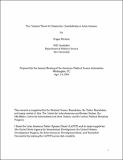| dc.description.abstract |
Drawing on more than 200 original interviews in Guatemala and analysis of data from the LAPOP 2008 survey, I argue that high levels of violent crime may imperil democratic consolidation in Latin America. At the individual level, crime victimization and concern about crime are correlated with support for authoritarianism and heightened levels of political participation. At the elite level, public concern about crime provides rightist politicians an opportunity to re-empower militaries, to enact repressive policing measures, and to expand the military’s role in the provision of domestic security. And at the conceptual level, high levels of crime and pervasive impunity are contributing to a widespread delegitimization of the idea of human rights in Latin America. Should crime rates continue to increase in the region, anti-crime movements and parties could mobilize large numbers of Latin Americans while threatening the quality and durability of democracy in the region |

